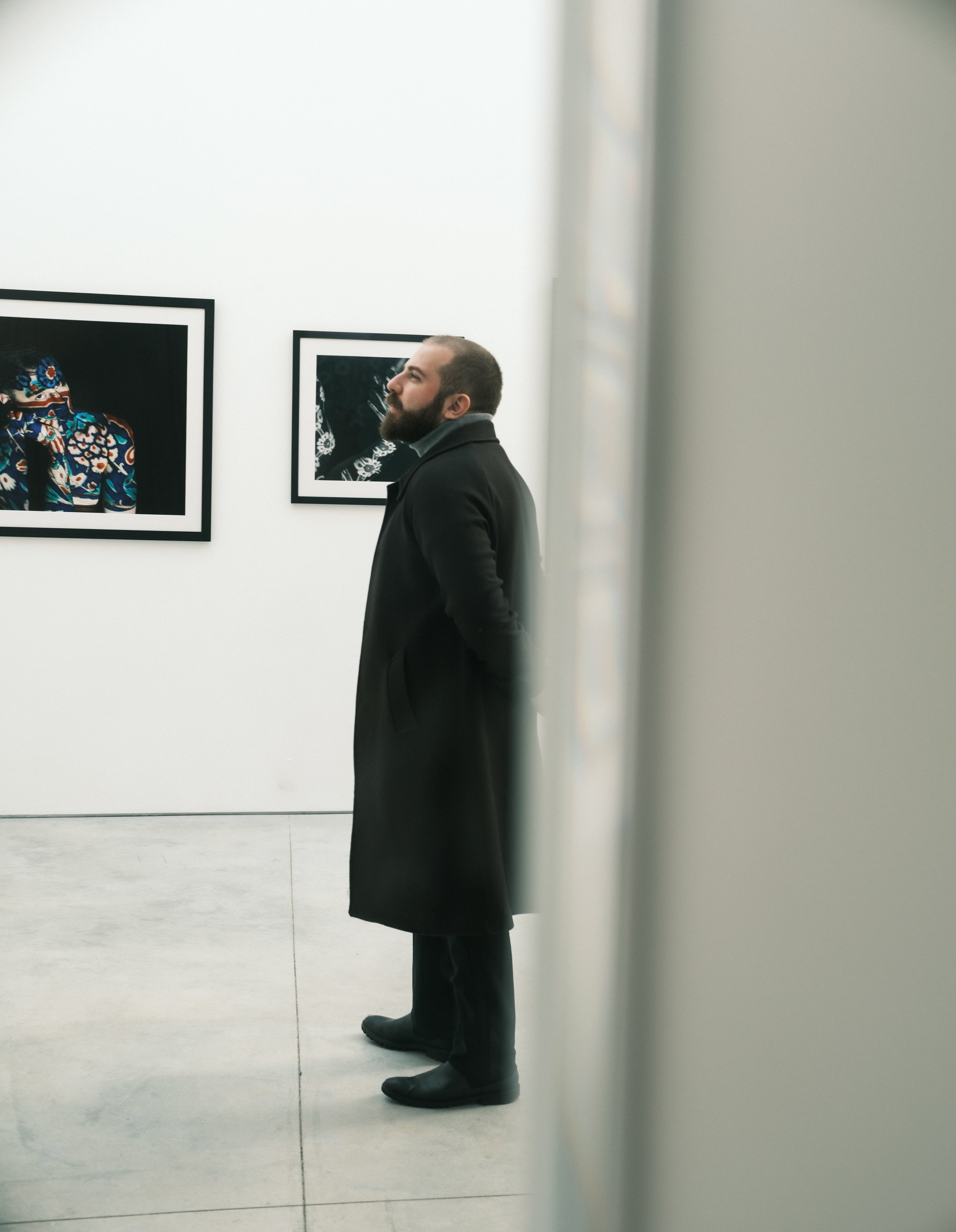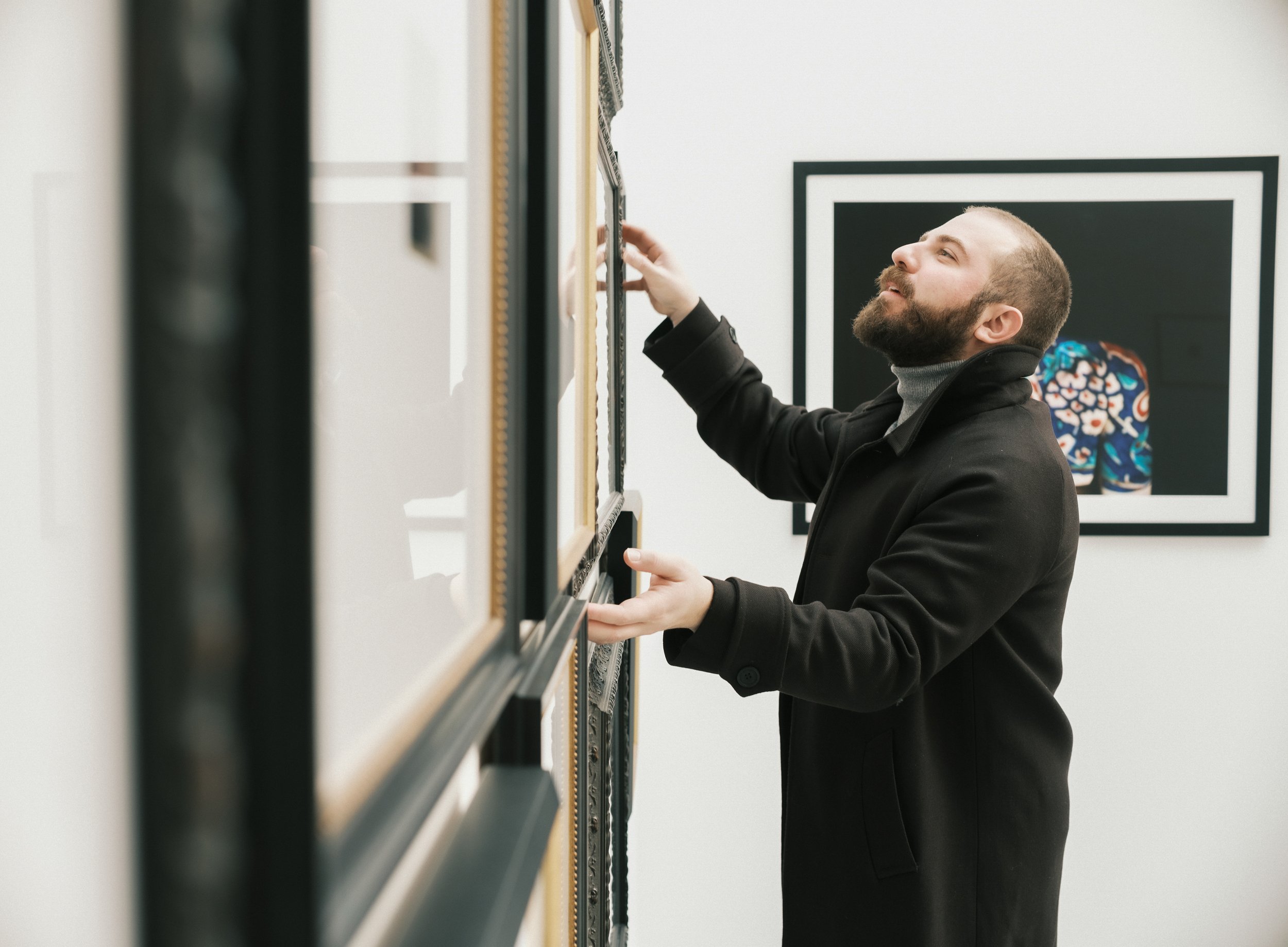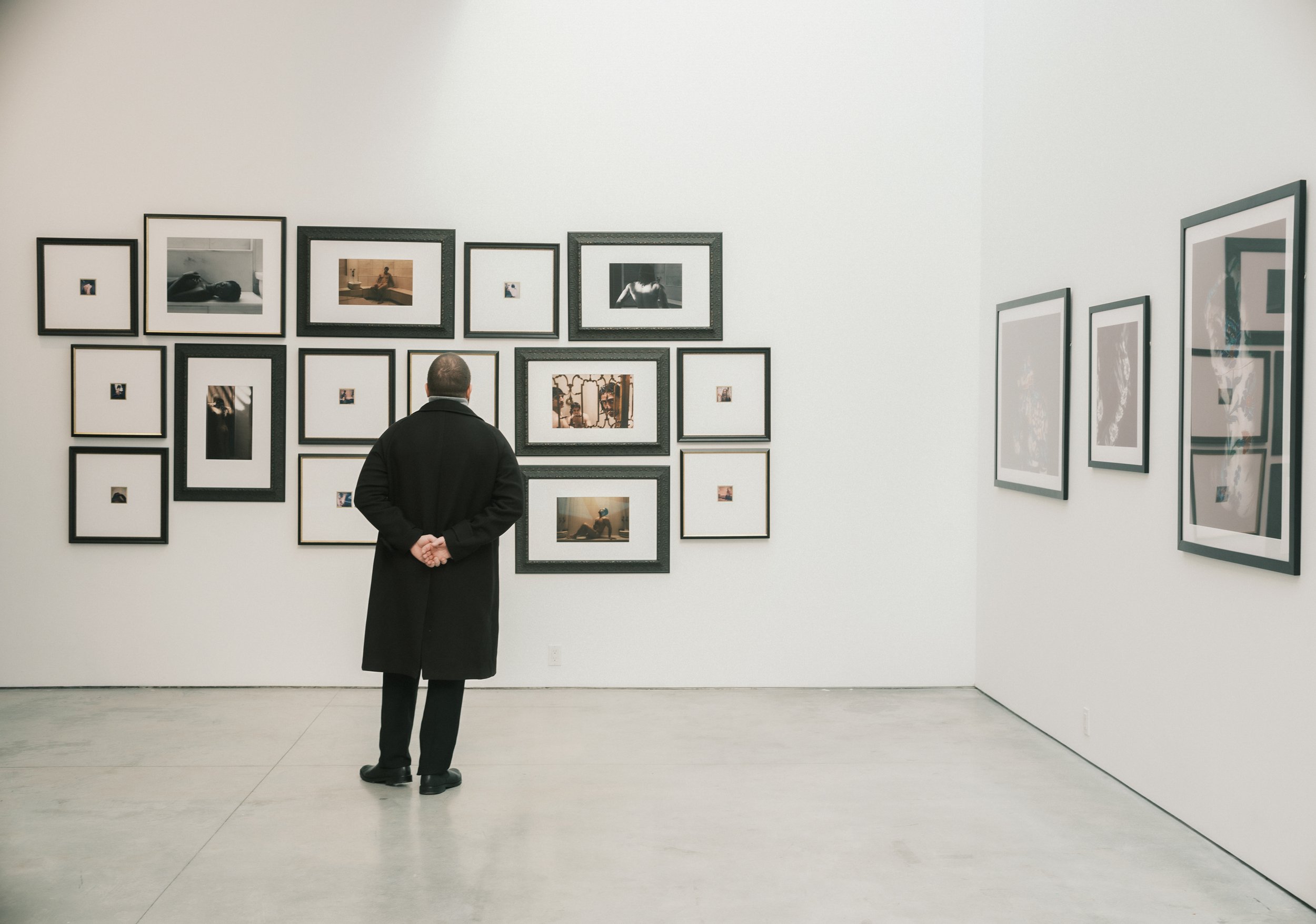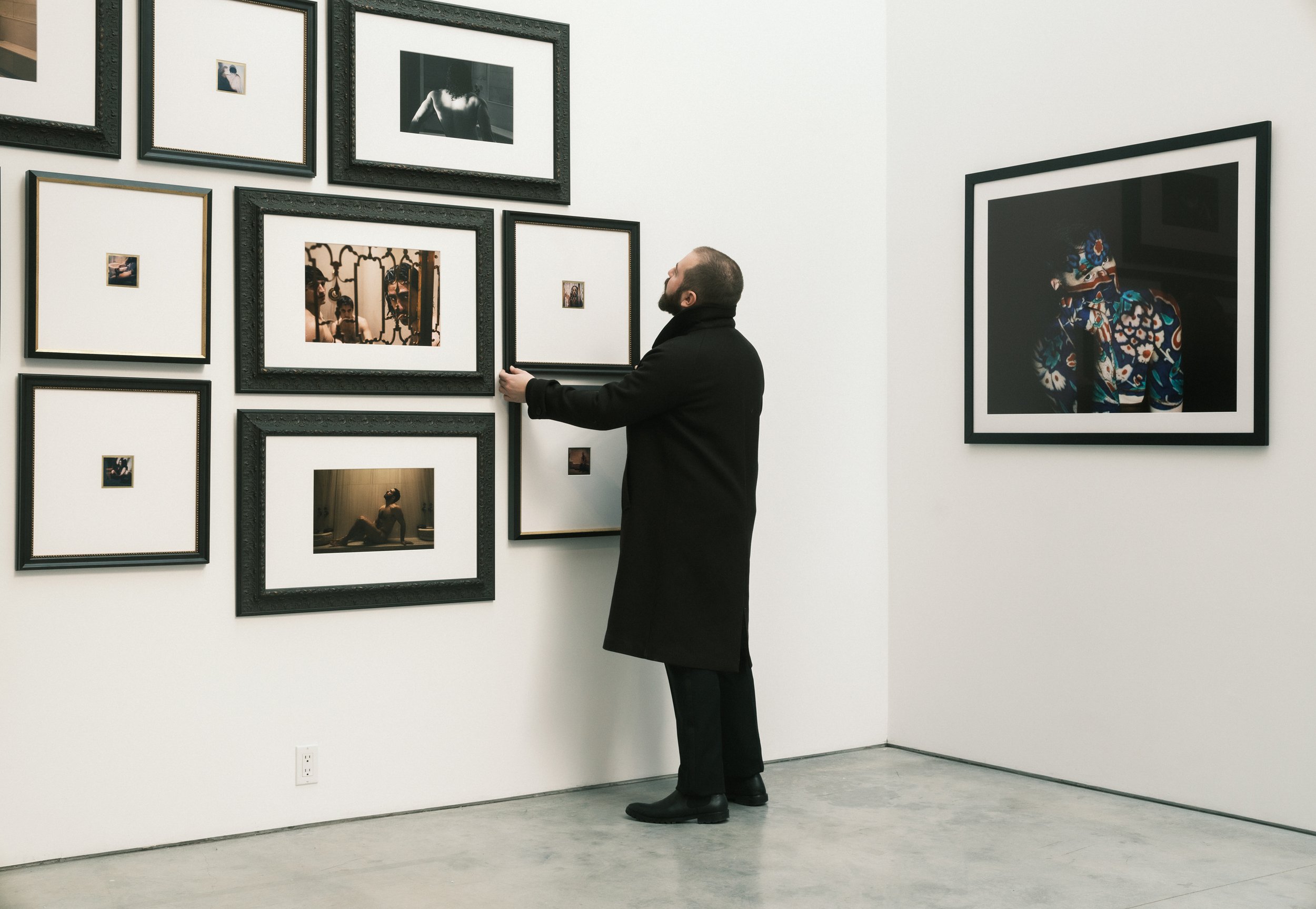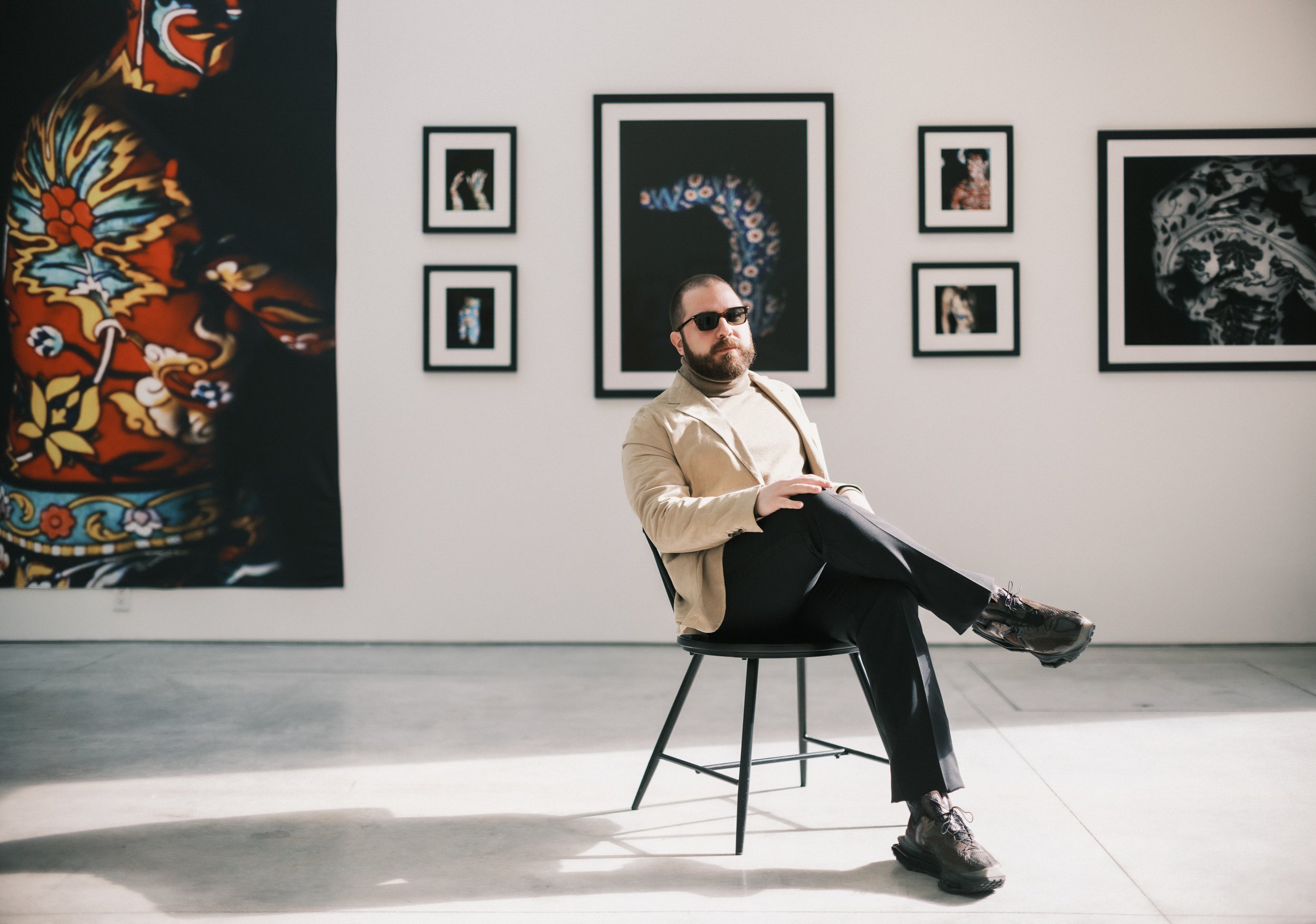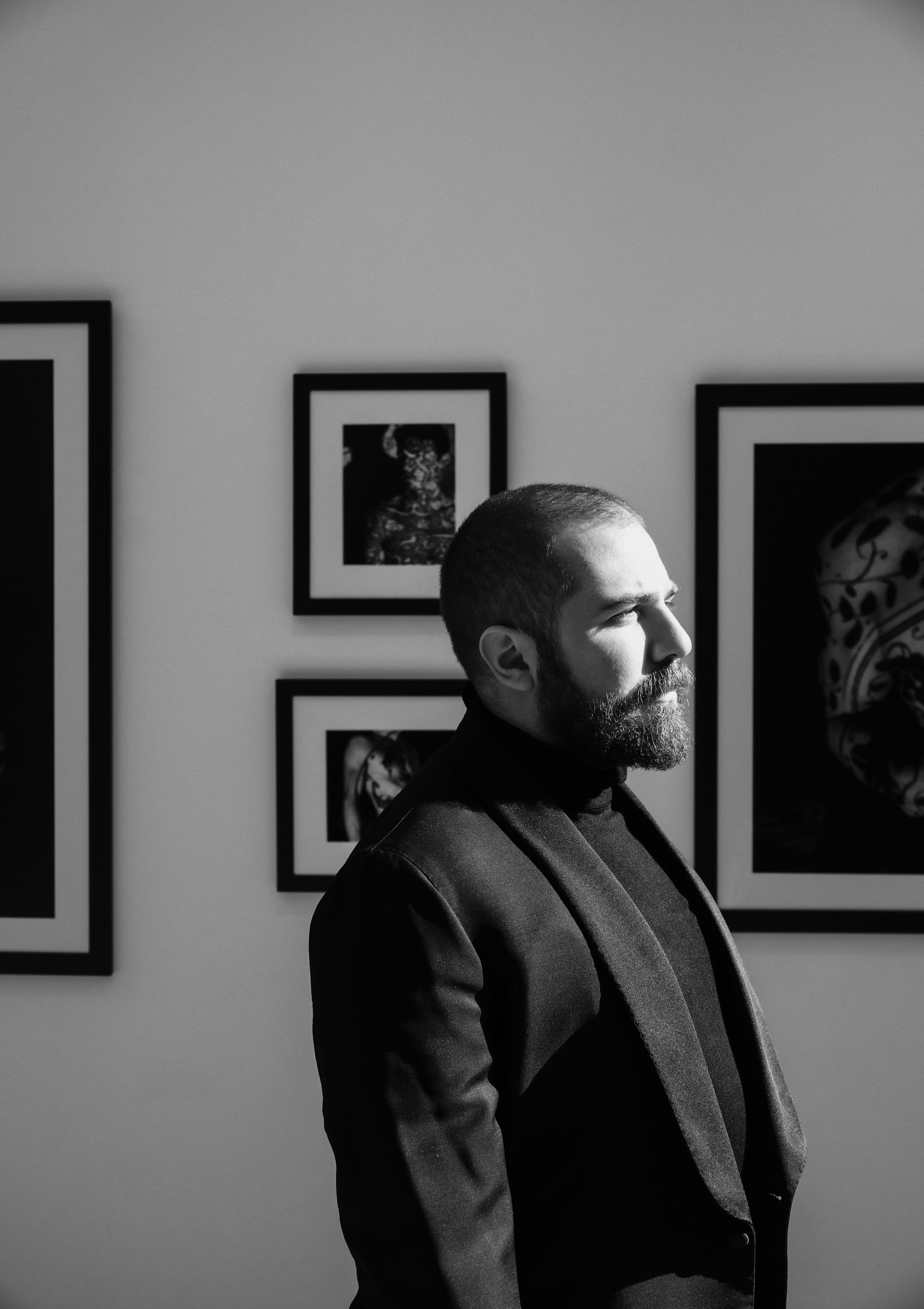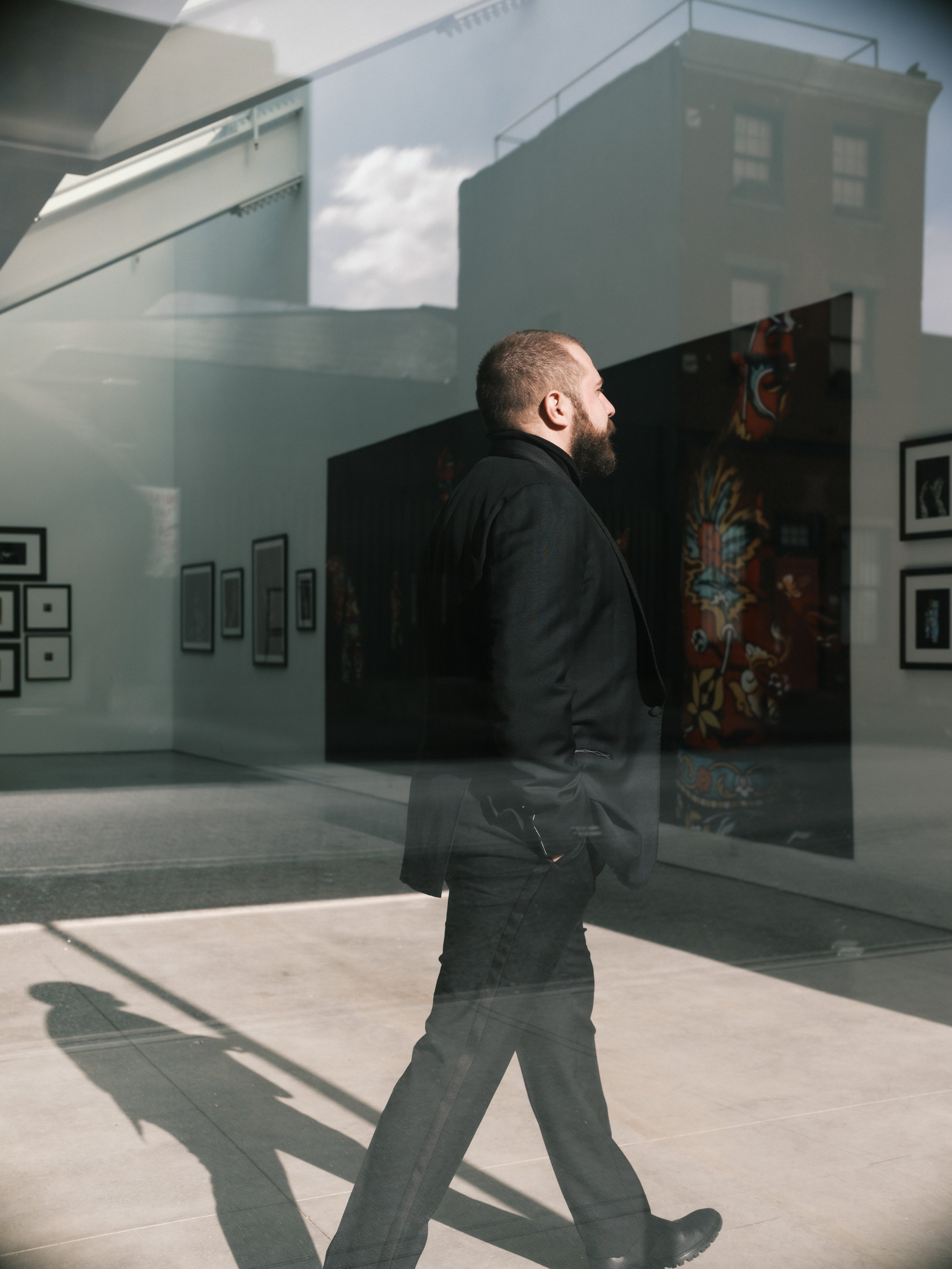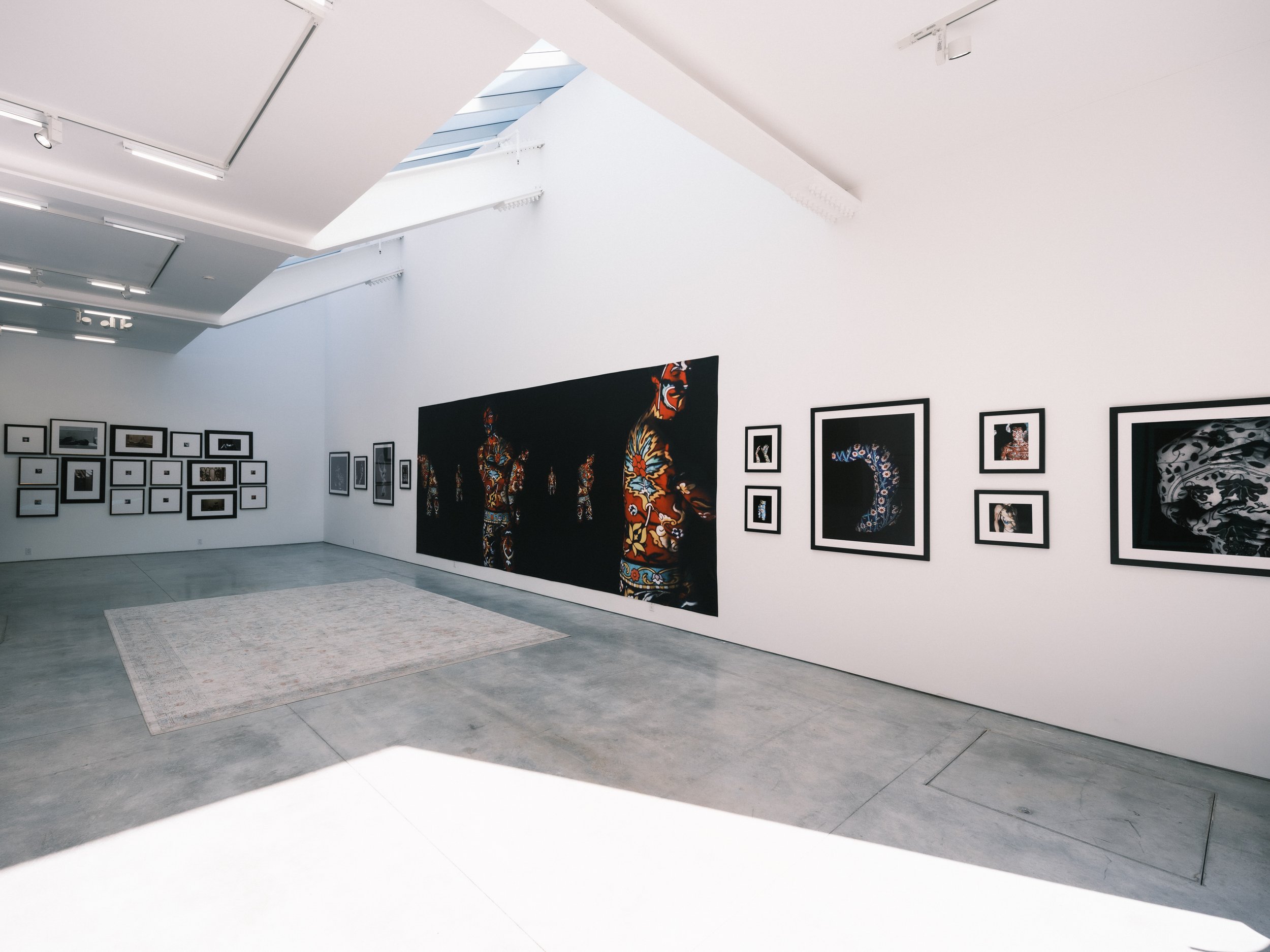History Repeats, With Sarp Kerem Yavuz
WITH SARP KEREM YAVUZ
In these times, something we often contemplate is strength. What it means to be strong, and what it means to have the Power to fight for what you want, need, and deserve.
Photography, Charles Roussel
Words, Caleb Church In Conversation with Sarp Kerem Yavuz
VIEW GALLERY
In this conversation, a very candid view on the volatility of governments, power, and freedom is had. It's a conversation free of the idea that "those things can't happen here." Because if anything over the last three years means something, it means this: anything can happen anywhere.
Sarp Kerem Yavuz is an artist born in 1980s Paris, who grew up in Istanbul, Turkey, where his art began as he watched the environment he grew up in change dramatically. And it's that story he's telling now through painting, projecting, modeling, and what is a new kind of sculpture. He originally moved stateside to attend Oberlin College in 2009 because he saw it as an escape from where he found himself. A world he learned about through episodes of Sex and the City, he recalls.
With a unique and soft perspective, we talk about how he's seeking to make something that feels ugly and into something beautiful so we can remember the past for a better future. A sentiment that makes the word "work" feel heavy in the term "an artist's work." This a good reminder of why we should thank artists: for telling the stories we otherwise might be unable to stomach or bear so that we can learn their wisdom.
I am happy that we were interrogating what power is, how it should be wielded, and how communities shouldn't be handled by any state apparatus that plays itself to bring order and peace.
Like any good artist, Sarp has something to say, and the pedigree of his work makes it crystal clear that he intends to push that message into the world with his entire being. So, we passed him the mic, and during our 45-minute conversation, he poured his heart out in a way I hadn't witnessed in a long while.
With much praise, the highly acclaimed photographer presents his latest exhibition, "Shadows of the Empire," which is open to the public in Chelsea until February 28th. Sarp has been recognized for his work with numerous awards, including the 2019 Leslie Lohman Museum Artist Fellowship and the 2016 Palm Springs Photo Festival Emerging Photographer award presented by Leica Camera. He has also received the New Artists Society Award from the School of the Art Institute of Chicago and the Leah Freed Memorial Prize from the Oberlin College Department of Gender and Sexuality Studies.
TO BOOK A STUDIO APPOINTMENT, EMAIL ASSISTANT@SARP.INFO
CC: What inspired your current show, Shadows of the Empire?
SY: So the show that's up right now, Shadows of the Empire, comprises two bodies of work. One body of work is more than the work I am known for, which is the projection mapping work, where I take traditional Islamic tiles from the Ottoman Empire and superimpose them onto naked men. The motivation behind that being my generation is being superimposed a version of conservative Islamic culture and conservative Muslim history that has a minimal basis in reality. So I took that symbolic superposition and I turned it into something literal to discuss the political landscape I witnessed unfold in the Middle East over the last decade.
I started doing that body of work after the Arab Spring. Because we all got tear gas in the summer of 2014, I've had friends who got beaten up and taken into custody. My father was beaten up in his ribs, and his fingers were broken. When I talked about the Arab Spring, I think people imagined this cute, innocuous protest as, "oh, yeah, you held the banner. And you got a little fear." No, it was very, very personal and very violent. But at the same time, I firmly believe in finding beautiful ways to remember even the most traumatic incidents because once you've seen one image of the police officer beating someone up or tear-gassing someone, you've seen them all. And you're not going to hang a frame for a picture of that on your wall.
But it's accurate and traumatic, and also violent. It is simultaneously too numb but simultaneously too visceral. So, my thinking was, how can I take what is happening here? How can I take this pain and turn it into something worth preserving? It still becomes part of your conversations by hanging it on your wall. But it's not, you know, things like pointing the finger at something so specific that you don't want to be looking at it all the time. And it's sad to me how violent the police are in this country.
CC: Is there a more profound message you want to bring awareness to behind the art?
SY: I was once told that countries are divided into two military and police countries. Governments are run by either one of these groups, mostly. And Turkey used to be a military country; Turkey went through three military coup d'etat where anytime the military was like, hey, you know, politically, you're going down a path, we can condemn, they would step it up, like, "Nope, we're hitting the reset button hard reset."
And what the current government did very successfully have they committed the ultimate act of revenge because the military was effectively preventing the defacto Muslim dictatorship from coming into power. They were like, and now we have so much energy that we will dismantle the military entirely. And we're going to turn the country into a police nation instead, where they installed their people in critical positions of power. And now the police run the country, and the police firmly 100% stand behind the finished president. That means they do his bidding, even though it might not necessarily be legal. And so I have seen this happen, step by step, very systematically, very patiently over the last 20 years.
I'm thrilled that we are now having a meaningful conversation in this country about the actual history of policing and what it has resulted in centuries later. And I am happy that we were interrogating what that power is, how it should be wielded, and how communities shouldn't be handled by any state apparatus that plays itself to bring order and peace. Like, it's so heartbreaking to me what is happening in this country right now. Yeah, I'm not too fond of it, but I come from a place where even the least even the judicial system will stand behind the police. So it's scary that we might be going in that direction?
CC: How do you see the western world moving in the same direction?
SY: I'm preoccupied. Maybe more than I should be about where America is going, if only because – And I've been saying this a lot since this exhibition opened – I grew up in a turkey that I witnessed become de-secularized over ten years… 10 to 15 years. And it is so terrifying to me how quickly specific conversations and certain philosophical viewpoints can become normalized by introducing Religion in a way that seems so innocuous. And then all of a sudden, teaching Religion as something that should be governing the way we approach a particular subject.
I can give the, like Roe v. Wade, where part of the narrative behind its cancellation is, but like, they also, you know, so many people have values that contradict it. And I'm like, Yeah, but this is not an official, like this country isn't, in theory, a theocracy.
[Religion] should not be playing a role in any law, but I see it become a more part of the conversation: the notion that our relationship with God should participate. And it's becoming normalized in a way where it's like, people aren't questioning what else can become normalized if it does. That's scary to me because I remember in the 90s when Turkey was so secular, modern, forward-thinking, and progressive. I recall pop stars being openly bisexual. I remember Spice Girls opening the spice World Tour in Istanbul – I think it was from 1996 to 9911.
And now, one woman who dares to wear a sheer cover-up with a beautiful bikini top underneath is taken in front of a judge within 24 hours for daring to be, you know, visibly sexually provocative. And the legal system is so fast that you would be taken in front of a judge in 24 hours. They wanted to make an example out of her. And that is where America is headed. So that's the motivation behind doing the work that I do, which is critical of what's happening in the Middle East. Still, also, I'm trying to show her to be like, hey, there are parallels here that people here should not ignore because the only way to stop America from going down that road is vigilance.
CC: What are the warning signs we should be paying attention to?
SY: I think one thing this shifted over time, and it grew into something that sounds so innocuous, which is family values. Any kind of queerness in the public sphere can be problematic because it contradicts family values. And when only the minute you say family values, you're trying to make it sound cozy and American, and wholesome. But really, what you're saying is, hey, this bothers heterosexual people, but we're going to legitimize that. And, like what's happening in Florida right now, the people running the state are waging war on trans kids. And they're asking for teachers to tell on their students by outing them.
It's terrifying because that's how these fascist institutions become legitimized. It's not by making the state apparatus the bad guy. It's by encouraging people to censor themselves or to out one another. Because if you can get the people out on the street to address each other, you don't have to do it.
So queerness was 100% behind my starting to take portraits, but I never in a million years described myself as a queer artist
CC: What do you think is keeping people from seeing the choices we have to make?
SY: I think so many moronic conversations bog us down. No, I remember when, like, gov. Michelle came out, and people were outraged that that was when Scarlett Johansson was playing it. Because when they interviewed people who are actually from Japan, everyone in Japan was like, No, we're happy that Scarlett Johansson is playing it. But I remember for like six fucking months, we discussed whether or not Scarlett Johansson shouldn't be playing Ghost in the Shell. The amount of space and time this conversation occupies could be better.
Like the point, this very performative, endless conversation is happening in this country about representation. Right, fixates on all of the wrong components of representation because it takes itself too seriously and too, literally,
One thing that drove me insane is I went to Oberlin College, and a few years ago, in the College Alumni discussion boards, there was this vast, like his story that broke out. And, what it was, was the cop shitty catering company that served the dining hall that made shitty sushi. Oh, no. And someone had managed to spin that into racism. And I was like, Are you honestly telling me that you're accusing an incompetent, Midwestern catering company of racism? Because they're not good at making sushi? Like, that's your angle? Right? Like, and I see this in every aspect of the public sphere right now, where people will go out of their way to turn an issue into a social one when it isn't.
CC: Do you feel like the Right is inside its echo chamber and progress has yet to come as far as we might have thought?
SY: Well, I'll give you one example. This happened yesterday. A guy came to the gallery, said he was a painter, and started talking about the work. And then he, very quickly, started talking about how he was happy, and I quote him now, he was saying something like, "oh, yeah, and Black Lives Matter is finally winding down, thank God." And then he looks at me, and he goes, "and also Antifa," and rolls his eyes.
And I'm looking at him and I'm like, "What are you talking about? What the actual fuck." I'll be referring to it here. What is the imagined need? Less? Like? And then he goes, "Well, even though Biden's are mega leftist." I'm looking at him. And I'm like, and You think Biden is a mega-leftist? What is very? How would you characterize Burgess' standards in a world where you imagine Biden, as far as the left, go? Right? Go, Biden is a centrist. Because that's what the environment calls for, the entire Democratic Party, I would argue, is just centrist right now because no one can particularly push out a more or less agenda. Because there's this bizarre post-McCarthy Era specter socialism that people don't even know what they're afraid of. But they know they're scared of something that'll threaten a capitalist world that they're not benefiting from, but they convince themselves they're benefiting from it.
And also, I'm saying all these things because I grew up looking at America as the Promised Land. As a gay man growing up in the Middle East, I grew up watching Dawson's Creek, wheeling grace, and Sex and the City and thinking, that's where I want to be because that's where I can be who I am, and maybe even be celebrated for it, which is just like so unthinkable as a queer man.
So I think, though, to finally be here, in an environment where on the one hand, I'm thinking, Yeah, we can even get married. Yeah, people are being very proud of their queer identities right now. Still, at the same time, there's been no other period in history where people felt so empowered to wage war on queer people, which is so disheartening and scary. Because I know how quickly laws can change and how quickly the things we fought so hard for can be taken away. Even when they were getting rid of Roe v. Wade, the sort of memorandum that the Supreme Court had was referencing Obergefell, which is the landmark case that won us our Right to get married. They were referencing it as Oh, like Roe v. Wade will be struck down because it's not constitutional. Much like Obergefell. And I'm thinking, Oh, great. They're telling us they're coming after us next, like love that for us.
CC: How do you feel identity politics have personally influenced your career?
SY: It's just so absurd to me because I remember at the beginning of my career that my first photo series was called substitutes for my father. And it was a series of Polaroid portraits, accompanied by interviews with people in my life about their relationships with their fathers. And my motivation for that was I had come out to my dad in 2008. And because he's a theatre director, I had naively assumed that he would be okay with my sexuality. And he wasn't, and that broke my heart, and I resented him so much for it that it consumed me. And the motivation behind the series was, can I create a significant enough context to find a place in my heart to forgive him, if only internally?
So queerness was 100% behind my starting to take portraits, but I never in a million years described myself as a queer artist when I explained the work because I felt like A, it's a given, and B, well, that's not the point. The point was about something that has been, like us, the subject matter at the beginning of time: our relationships with our fathers. And I felt like there was a universality to that. But over the last decade, I've noticed how different curators, art on various art texts, or even interviews would bring that body of work out. And it was referred to more and more as sort of like an "Oh, and look, this man is queer," as if I needed some proof visually. And then what bothered me the most was that I see it show much more often today that I needed to be designated as a queer artist because I have straight painter friends.
So, that person can exist as an artist. And that's enough. Why do I need to be a queer artist in opposition to that? Like, why do I need that? Why do I need the signifier at all? This is to say that I'm not; I am a queer artist, and I'm very proud of that. And I'm happy that we're in an environment where we can discuss that openly. But why do I need that specific terminology to be in the same landscape? Or to be deemed relevant by any press?
CC: How are you continuing to make an impact with your work, and how are you engaging the community?
SY: We've hosted several artist's talks, which I find to be extremely valuable because I think it's essential for us to ask these questions not only through their work but literally, frequently where if we find ourselves in positions where we can ask specific questions that a lot of people in professional spheres are not as empowered to ask. And we can galvanize our audiences by saying, hey, you know, like, thank you so much for being here. Thank you so much for supporting these visual works. But what are you doing in your lives by interrogating people, not examining them, but by asking people questions that I think they don't ask themselves?
Shadows of the Empire is more than the title and Star Wars. People don't look at Star Wars and think about the Vietnam War, and I know that Disney would certainly not want to bring it up. It's essential to look at some of the symbolic elements embedded in pop culture because the minute you look at Star Wars and start thinking about the Vietnam War, you begin reassessing a narrative that was so beloved and so innocuous in your mind. And then you start looking around yourself differently, and you start thinking about the role that systems of power that you support, directly or indirectly, play in a larger sphere and what your responsibility is concerning that.
I have friends who still don't believe in voting. Your vote matters there. There were days during the last election when it came down to five votes. And it's insane that people are so clueless about the power they wield because it's literally by convincing individuals to do the right thing and taking responsibility for their presence and impact. Because so many people need to realize they have an effect.
I have friends who still don't believe in voting. Your vote matters there.

